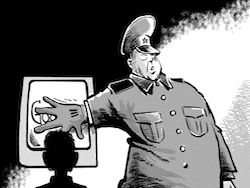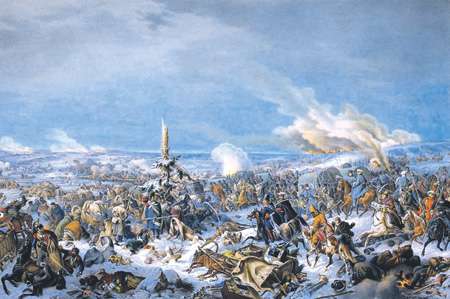
After protests 2011 Kremlin has identified new sources of threats that were previously considered insignificant. This Internet media, social networks, and by itself the Internet space. Them consistently attacked, after which, on the idea that nothing inappropriate of them to grow no longer. But the Kremlin has won the Internet sample in 2011, and in five years, many things have changed
Show full…
It would seem, what could be more boring than the upcoming Duma elections in Russia. After all, they will not couple to the bright campaign of 2011, then turned, essentially, into a referendum for or against the party in power with a series of street protests after. This year’s obscenely sleepily. Just five months later, in September – right after the vacations and villas, the vote, and a bright political struggle have not yet seen.
You can imagine how the Department of internal policy of the Kremlin is rather rubbing their hands. They have escaped (well almost) another fork in the Maidan. Conducted a powerful work on the bugs revealed in advance of the point of bifurcation and extinguished it. Now you can relax, watching Yashin with Kasyanov at one another’s throats on Facebook, and people Navalny and Khodorkovsky are divided the uninominal districts.
From the point of view of the President’s administration, they were all provided. The nightmare-2011, when the situation is out of control, can’t happen again. Don’t have to. Past mistakes are considered and potential sources in advance are neutralized, removed the chief editor, then pushed the owner, the case has been started, and the other hastily left the country.
With special diligence on domestic and foreign experience were studied the dangers of the Internet, and appropriate action taken. Largest independent online media, which, in the opinion of the Kremlin, not just actively covered the protests of 2011, but also participated in their organisation, or closed, or changed their editorial policy. Established mechanisms for large-scale Internet censorship: only in 2015, according to the human rights organization “Moskomsporta”, in Runet was blocked more than a million sites.
Largest social network “Vkontakte” was transferred in a controlled manner, and its Creator Pavel Durov sent in polutorapolnoy emigration. The authorities are ready to possible to disable Facebook and Twitter – crisis situation during the trial of Navalny brothers have shown that they will not go to unconditional cooperation with the Russian authorities.
Inefficient street youth movements like Nashi are collapsed. Instead, they created a system for the manipulation of public opinion on the Internet by using factories trolls and cremlebi. In the summer of 2014 held a training on the actions of the authorities when disconnecting Russia from the global Internet as a whole.
If to summarize the above, it is clear that the identified priority threats, especially those that were previously considered insignificant. This Internet media, social networks and the organization of the Internet space as such – and they consistently were struck, after which, on the idea that nothing inappropriate of them to grow more.
In this excellent at first glance, the argument has a serious logical error. The Kremlin generals carefully prepared for the previous war, have won the Internet sample 2011. But in five years many things have changed.
First of all, over the years, another 22 million people in Russia made a habit every day to use the Internet (data RAEC). Now their 66 million people. The cumulative audience of a Runet has grown to 80.5 million this year. Simultaneously, for five years, the index of Internet freedom in Russia, according to Freedom House, has risen from 52 (partly free) in 2011 to 62 (all proprietary) by 2016.
The Internet was different, and not just technically: people became much more, but the site itself was regulated by the state. But not completely: now there is alternative infrastructure to bypass official barriers.
That boom instant messengers with their data protection – in Russia it occurs as East Asia. Not just mythical revolutionaries (or Islamist extremists, according to Russian investigators) sitting in podzamochek chats in Telegram, the new brainchild of the Creator of “Vkontakte” Pavel Durov, but also students, managers, businessmen. Whatever censorship nor introduced, their communications remain protected, and, say, a spontaneous gathering, organised through such a channel, it is simply impossible to tell in advance.
Following the Telegram, which made the secrecy and security of his business card, recently encryption of the transmitted messages all over the world and launched a much more mainstream WhatsApp, and now it’s a problem not only Russian special services.
In recent years created dozens if not hundreds of more extreme applications that allow you to communicate and coordinate actions in conditions of a complete shutdown of the Internet and even mobile communication. The most famous can be considered Firechat, the app, created by Russian developers and successfully tested during the Occupy protests in Hong Kong: it connects closely spaced to each other phones in the network via Bluetooth ports.
Add to that a variety of closed online communities – from darknet (literally underground of the Internet where there are only connections, without intermediaries such States there replacing the technical elite of the Runet, the persecution of the torrents) to conventional closed forums where it is impossible to get from outside.
In addition, enough and simple technical limitations in which to live Russian secret online censorship: for example, she still has not learned successfully to ban, that is, to deny applications for iOS or Android.
Russian government just cannot keep track of everything. Even if Putin will lead not one counselor over the Internet, and will hire a dozen of the best metaanalytical the world, he still will not shut all possible future holes. It is simply impossible.
In 2011, the Kremlin considered minor online publications and social networks and eventually received a Marsh. Today, he inevitably again, something’s missing, though, and wants to keep track of everything.








